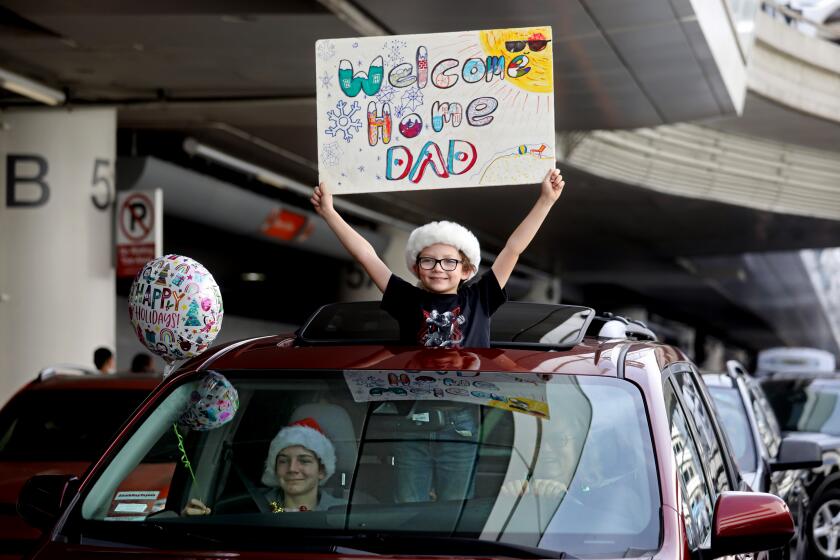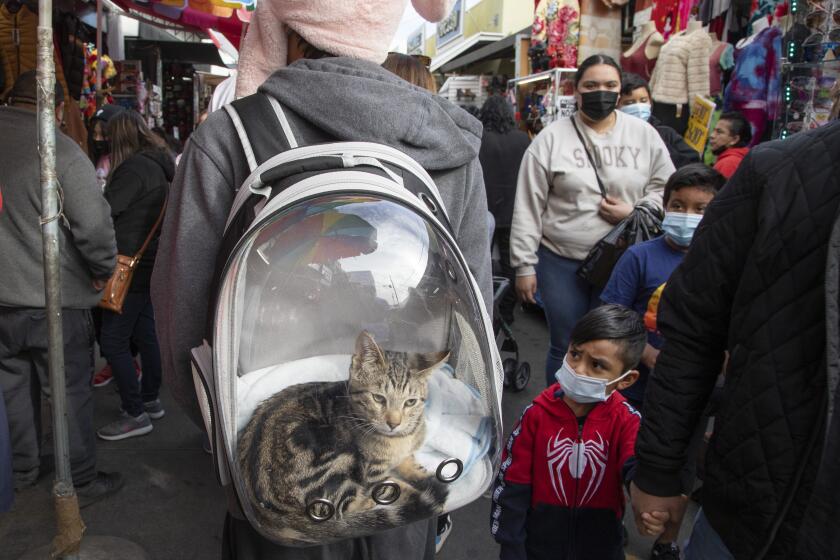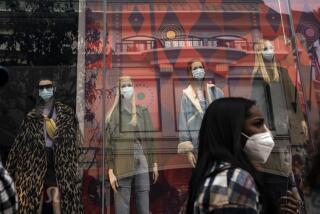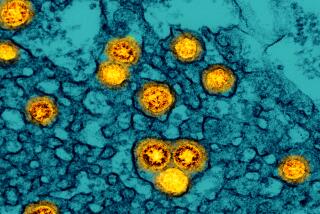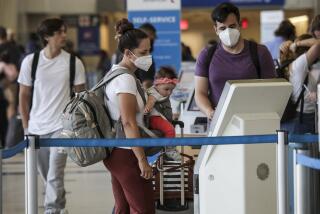Omicron may bring record-breaking daily coronavirus cases but fewer deaths, forecast says
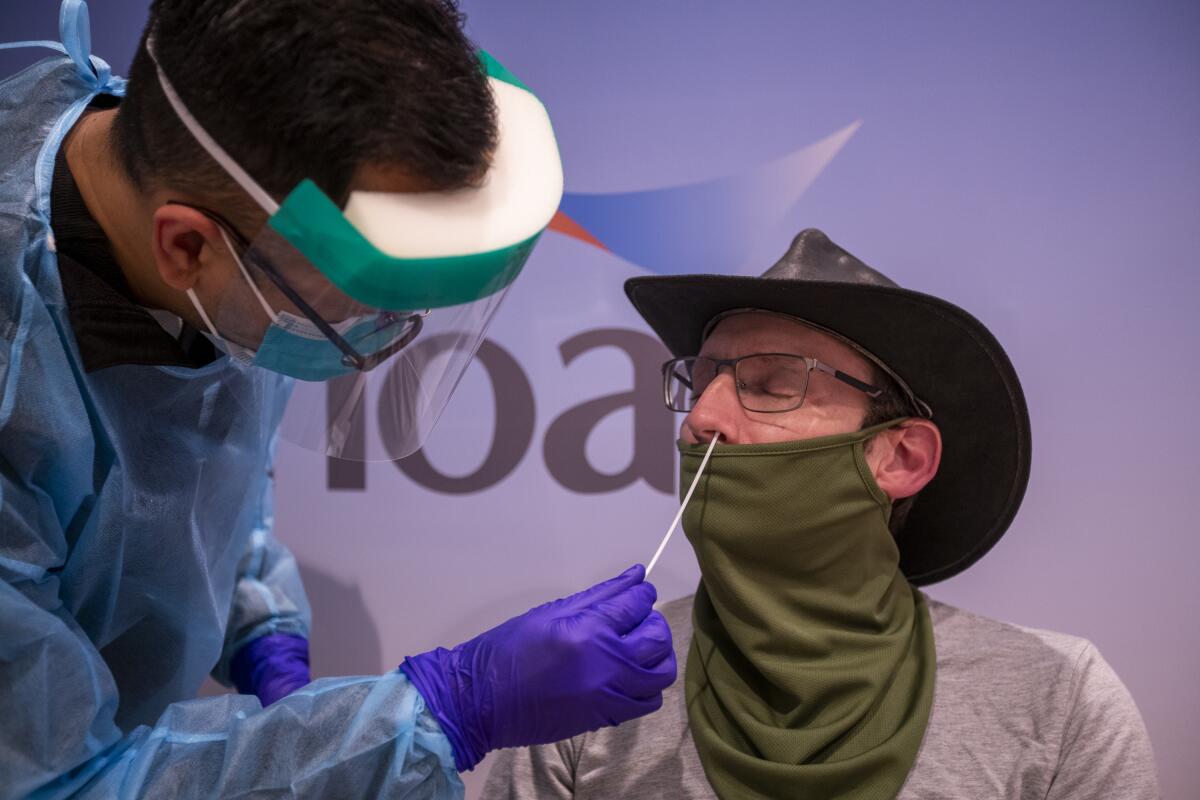
- Share via
A highly influential COVID-19 forecast is projecting that the Omicron surge may result in as many as 400,000 new coronavirus cases a day across the nation — significantly higher than last winter’s record of 250,000 cases a day.
The University of Washington’s Institute for Health Metrics and Evaluation projects the Omicron surge will continue rising swiftly through December and into January, potentially peaking later next month or in early February. Despite the increase in cases, predictions indicate there will be fewer daily deaths than during last winter’s devastating peak.
The nation — and California — are already showing troubling signs of an Omicron-related surge. The U.S. is reporting an average of nearly 150,000 new coronavirus cases a day, approaching the peak of the summer Delta wave, which reached 164,000 new daily cases.
The number of COVID-19 hospitalizations during this winter’s peak could be slightly higher than last year, the forecast says.
Up to 3.5 million people are expected to travel through LAX from Dec. 16-Jan. 3, airport officials said, making it the busiest travel period this year.
The institute also predicts that single-day COVID-19 deaths could climb as high as 2,000 nationally by early February, about the same number reported during the Delta surge but fewer than the nearly 3,500 daily deaths during last winter’s peak.
The forecast for California projects as many as 150 COVID-19 deaths a day by the end of February, a rate similar to the peak of the summer Delta wave. Still, that is far less than last winter’s surge, when California was tallying 550 deaths a day.
Increased mask use could result in substantially fewer coronavirus cases, COVID-19 hospitalizations and deaths, the forecast says.
Ali Mokdad, a professor of health metrics sciences at the institute, said that booster shots will also help.
“Getting a third dose for those eligible will substantially increase protection. Mask wearing remains a very effective strategy to avoid Omicron transmission and infection,” Mokdad said on Twitter.
Some experts think it would help to make some adjustments, but many health experts are also emphasizing the importance of seeing family and friends.
“The unvaccinated and never-infected are at greatest risk. Vaccination for the unvaccinated is a powerful way to reduce personal risk. For those at increased risk due to age or comorbidities, avoiding indoor gatherings can further reduce risk,” he added.
In the coming days, COVID-19 hospitalizations will be a more relevant way to determine actions that local authorities may need to take, Mokdad said. That’s because, while Omicron is rapidly spreading, there also will be a relatively high percentage of people infected with the variant who will remain asymptomatic. In addition, there will be a lower percentage of newly infected people who will require hospitalization.
Nonetheless, experts say the ultra-contagious nature of Omicron means that an extraordinarily high number of people could get infected simultaneously. Even if a lower percentage needs hospital care, if there are enough people who are infected simultaneously, that could result in strained hospital systems and, in some areas, overwhelm them.
The Omicron variant has prompted some regions to reinstitute curfews or lockdowns, but no such measures are currently planned in Los Angeles County.
Health officials in Los Angeles County have recently said that large indoor gatherings are particularly risky as transmission rises. Risk can be reduced by holding events outdoors.
In a separate report earlier this week, the U.S. Centers for Disease Control and Prevention said early forecasts suggest a large surge of infections could be reached as soon as early January, and “the peak daily number of new infections could exceed previous peaks.”
Dr. Anthony Fauci, President Biden’s chief medical adviser, said in an interview on ABC’s “Good Morning America” that he expects that, during this wave, almost everyone is “either going to get infected — particularly the unvaccinated, or be vaccinated.”
“And the vaccinated people, particularly the boosted people ... will either be protected from infection, or if they do get infected, they’ll have a relatively mild course of infection,” Fauci said. He said he expects a peak in Omicron cases within a matter of weeks, followed by “just as dramatic a decline.”
Fauci called Omicron transmissibility’s extraordinary.
“Certainly, this is unprecedented to see this rapidity with which any individual virus spreads throughout the world. It is really extremely unusual.”
In various television interviews, Fauci has said that family and friends can expect relatively safe and enjoyable Christmas gatherings — without masks — if everyone 5 and older is vaccinated and has received a booster shot if eligible. He also suggested attendees get tested before gathering.
“If tests are available, by all means, go the extra step, go the extra mile to get testing, which we’re recommending just to get that extra added cushion of alleviation of concern,” Fauci said on NBC’s “Today” show.
Some experts think it would help to make some adjustments, but many health experts are also emphasizing the importance of seeing family and friends.
“But if you don’t have the availability of the test and you are fully vaccinated and boosted, you should feel comfortable having a holiday meal or gathering with family members who are also vaccinated and boosted,” Fauci said. Still, he noted, such gatherings are not risk-free.
The CDC said Omicron is spreading rapidly not only because it is more transmissible, but also because it has a better chance of infecting people, even those who have been vaccinated or previously infected.
Vaccinated people are likely to become less severely ill from Omicron, especially if they have received a booster shot.
Unvaccinated people are at highest risk of severe illness from any coronavirus infection.
The first publicly confirmed Omicron case in the U.S. that has resulted in a death was reported in Harris County, Texas — a man in his 50s who was unvaccinated and had previously survived a coronavirus infection, and had underlying health conditions that placed him at higher risk of severe complications.
Early data from Britain show that vaccine effectiveness against symptomatic infection from Omicron is 88% shortly after the second dose of a Pfizer vaccination, falls to 34% about six months after the second dose, but rises to 76% after a booster shot.
The data show that protection against symptomatic infection from Omicron is still decent after a booster shot, but not as good as that against the Delta variant.
In combatting Delta, vaccine effectiveness against symptomatic infection was also 88% shortly after the second dose of a Pfizer vaccine, falling to 64% about six months after the second dose and then rising to 93% following a booster.
More to Read
Sign up for Essential California
The most important California stories and recommendations in your inbox every morning.
You may occasionally receive promotional content from the Los Angeles Times.


